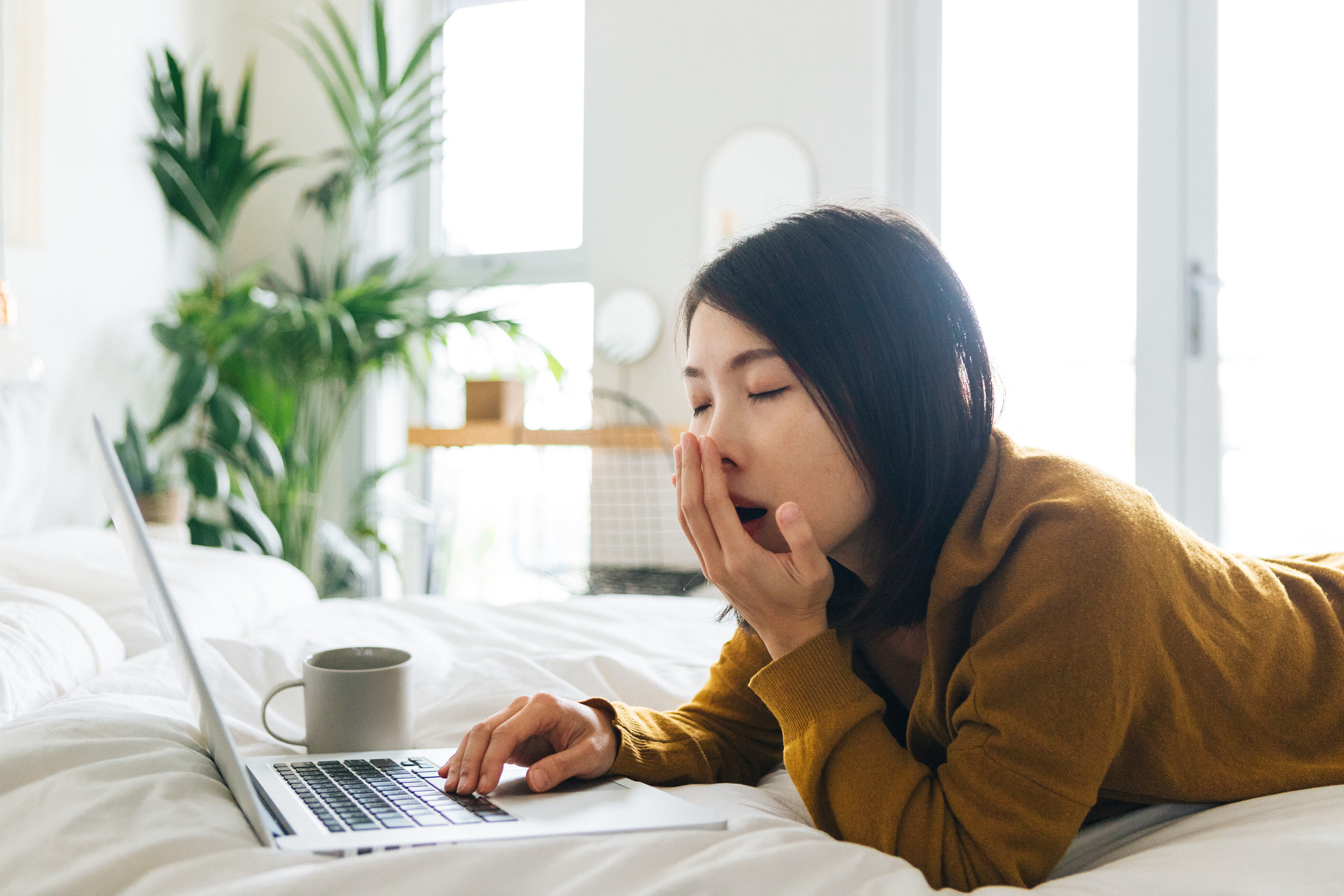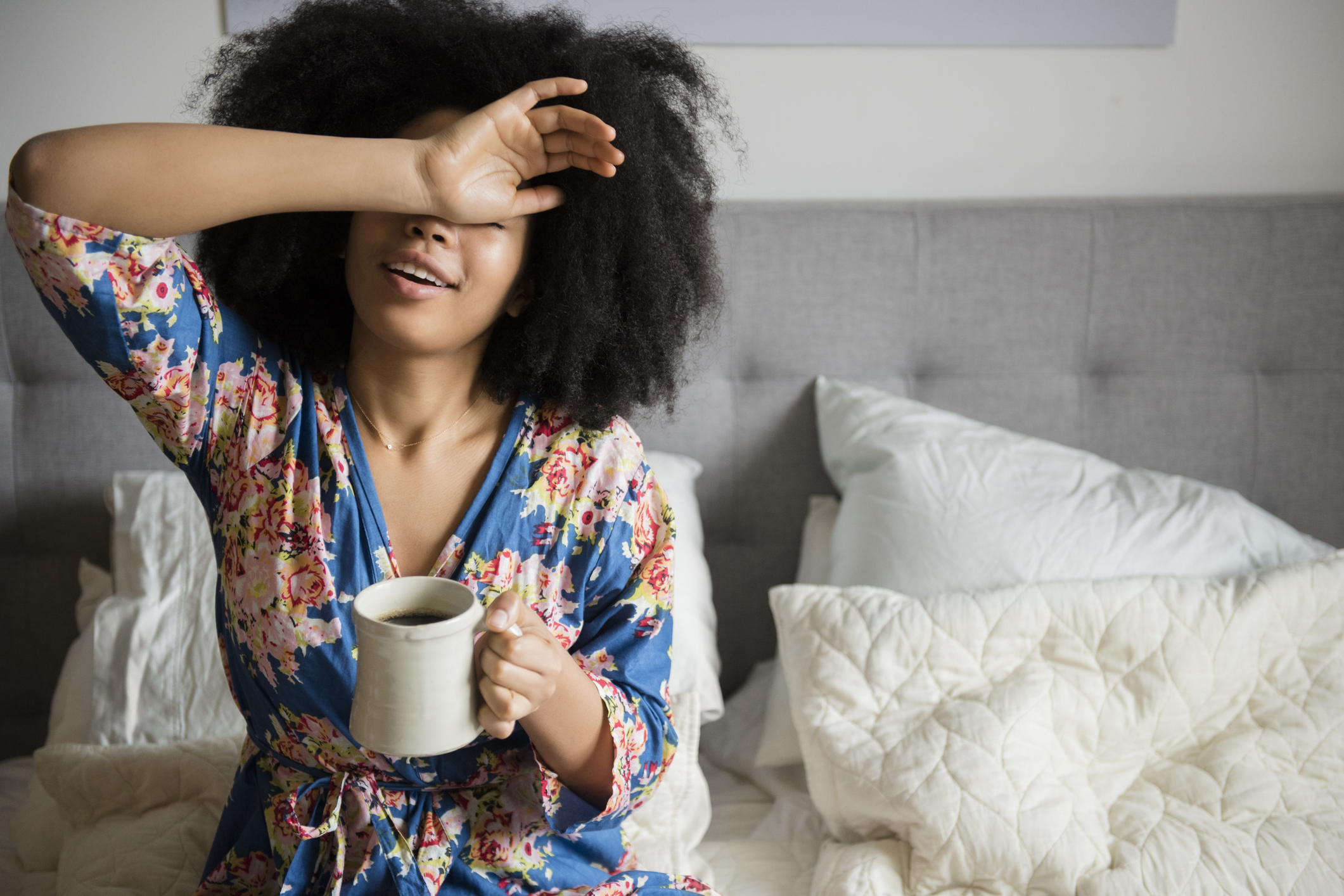
Celebrity news, beauty, fashion advice, and fascinating features, delivered straight to your inbox!
You are now subscribed
Your newsletter sign-up was successful
A huge 51% of Brits report feeling exhausted - here, an expert shares how to fix.
Suffering from constant brain fog, debilitating headaches or aching limbs and constantly find yourself searching how to get to sleep? It might be worth reading up on the symptoms of exhaustion, because believe it or not, it's more common than you might think.
While we've already bought you an extensive expert-led guide to insomnia treatment, you may not know the difference between being super tired and actually exhausted. Because when the kid/dog/anxiety keeps you up all night, it's pretty exhausting.. but likely doesn't count as genuine exhaustion.
Keep reading for your need-to-knows.
What is the definition of exhaustion?
Doctor Audrey Tang, a positive psychologist, mental health and wellness expert and author of The Leaders Guide to Resilience, explains that exhaustion is the physiological state the body falls into after a period of chronic stress.
"Unfortunately, as much as we may want to believe we are invincible, we all have a level of stress up to which we can tolerate. Beyond that the mind may just about be willing, but the body is not."
"Think of it like an elastic band – continue to stretch it and at some point it may snap or go flaccid and cease to function as an elastic band. This is known as exhaustion," she explains.

Exhaustion symptoms: 11 to watch out for
There are a number of potential indicators which suggest that your general wellbeing is suffering. They may present in psychological, social or biological ways, which include:
Celebrity news, beauty, fashion advice, and fascinating features, delivered straight to your inbox!
- Irritability
- Seeming very tired
- Brain fog
- Headaches
- Inability to sleep
- Tearfulness
- Inability to focus or zoning out
- A change in eating habits – eating or drinking more or less than usual- and if eating more - often of high calorie items
- Refusing invitations, or alternatively going to all of them and perhaps over indulging in a noticeable manner (that differs from their usual behaviour)
- Susceptibility to illness, often because of a depression of the immune system
- A lapse in personal grooming
- A slower pace of life generally.
All of these signs may be indicators of other issues but are also commonly exhaustion symptoms, the psychologist explains.

Exhaustion treatment: how to cure yours
So you've read up on the exhaustion symptoms, but how do you get rid of it if you think it might be affecting you? Unfortunately it can get to the stage where you need professional intervention. "Going to speak to your GP will likely be the best start," says Tang.
However, one of the simplest ways of treating low-level exhaustion is by trying to prevent it from reaching the point of crisis in the first place. This can mean making subtle, but consistent changes in your life, like the following.
1. Eat well and exercise
Simply, but seriously important, stresses the psychologist. "Remembering that your physical health affects your mental wellbeing. Make sure you're eating well, sleeping lots and exercising, too – getting the blood pumping can help clear your mind," she shares.
2. Get enough sunshine
Getting outside can help you get more Vitamin D, which can increase feelings of happiness and counter things such as Seasonal Affective Disorder, explains Tang. "Fresh air is good for us - just make sure you're dressed suitably for the weather," she stresses.
3. Create a positive living environment
You know - decorate your space with photos of the people you love, or things that provoke feelings of comfort.
"This can help you feel good when you are having time alone," the psychologist explains. "Now may be the time to indulge in a bit of DIY, or at least making the area you spend time in inviting through plants, colours or textures."

4. Meet like-minded people
Another exhaustion treatment-slash-prevention that'll improve your quality of life? Try branching outside of our immediate group of friends and family - you'll likely find some friends who share the same interests. Not sure how? Try the following:
- Join a class or a club – something you always wanted to try, or something you always enjoyed. There you may meet like-minded people where you know it will be possible to connect on some topics of conversation. Our guides to the best gym classes and yoga classes might help.
- Volunteer somewhere – this may also allow you to feel fulfilled at being able to give a little time back to the community.
- Talk about your feelings with a coach - our guide to how to find a good coach may help.
5. Avoid back-to-back meetings
This can be hard, but is important, says Tang.
"As a coach, I would never schedule clients directly one after the other – whether online or in my office – because it is extremely exhausting to give your full attention to one person and switch to the next," she shares. Someone will lose out, and that someone is most likely you, she explains.
Aim for a 30 minute gap in between meetings, where possible - "you owe it to yourself, your team and your business to be fully present when discussing the issues important enough to meet over," she stresses.
6. Ensure offline time
This one's important for avoiding burnout.
"Switch off, go out into the garden, or at least open a window. Get some time away from the glare of the screen and take a moment to be informally mindful. Listen to the birds, feel the warmth of the sun and breathe deeply," Tang advises.
Just because, in principle, being online means you don't have to move, doesn't mean you're not expending mental energy, she stresses.

7. Work out your ying and yangs
"This is one of my favourite tips," shares Tang. It works in three stages:
- Recognise when you are enjoying something.
- Decide if that activity energises (yang) or relaxes (yin) you.
- Decide what you need – and pick from the list of things you know you enjoy.
"The secret to this is that if you are feeling stressed, then something that relaxes us is going to be far more effective at relaxing us than something that energises us," explains the psychologist. "If we are feeling down or apathetic, then an energiser may be more useful than a relaxant."
8. Build your positivity reservoir
Last but by no means least, if you're prone to feeling exhausted, honing back in on the things in life that make you happy, and the times when your life was a little more balanced, could just help you get the all-important shut eye and mental switch off you need.
Tang suggests trying the following:
- Having photos of moments you love in a screen shot album to remind you you’ve made a difference
- Checking in regularly with good friends
- Laughing - a lot (there's no harm in cat videos, as long as you don't spend all day watching them)
- Positive affirmations
- Gratitude.
"Ultimately, remember that looking after yourself means that you are at your best when you look after others," Tang explains.
Your complete guide to exhaustion symptoms, sorted.

Ally is Marie Claire UK's Senior Health and Sustainability Editor, a well-regarded wellness expert, ten-time marathoner, and Boston Qualifying runner.
Utilising her impressive skillset and exceptional quality of writing, she pens investigative, review and first-person pieces that consistently demonstrate flair and originality.
As well as writing, Ally manages a team of freelancers, oversees all commissioning and strategy for her pillars, and spearheads the brand's annual Women in Sport covers, interviewing and shooting the likes of Mary Earps, Millie Bright, and Ilona Maher. Shortlisted for three BSMEs and winning one in 2022, Ally lives and breathes her verticals: her eye for a story and connections within the wellness sphere are unrivalled. Follow Ally on Instagram for more.
